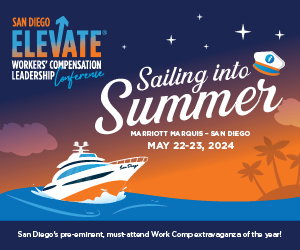Test Your Employment Law Knowledge - Answers
Monday, July 4, 2005 | 0
The following are the answers, as well as additional educational information and clarification to the TEST YOUR EMPLOYMENT LAW KNOWLEDGE quiz in part 1 of this article series (see sidebar at right):
QUIZ ANSWERS
1) This is a trick question. According to virtually every document written on Return-to-Work programs, these are all benefits.
2) The correct answer is a, based on a poll of companies that had instituted worksite accommodations. The Job Accommodation Network (JAN), which is a free federal service associated with West Virginia University also showed that the median cost for an accommodation during this time period was $200.00.
3) True. All employers are required to develop and maintain a reasonable accommodation policy under the Fair Employment and Housing Act.
4) According to a Merck/Rutgers study on employee replacement cost, it takes 13+ months and an average of 33% of co-workers time for a new employee to reach 100% productivity.
5) Injuries that occur outside the workplace, even in an employee's home, may be covered by workers compensation insurance, if they arise out of employment or occur in the course of employment. This could include commuting to/from work if the employer controls the commute route, using a cellular phone for work activities during commute time, or driving on company related errands.
6) Litigation under the Fair Employment and Housing Act is a civil matter and is therefore unlimited with regard to awards. These awards are typically not covered by business or liability insurance.
7) An employee has the right to select the doctor providing medical care for an employee's work-related injury or illness for the first 30 days, unless the employee has predesignated a physician.
8) All of these were found to be correct based on information gathered through the employee replacement cost study completed by Merck/Rutgers.
9) If an employee only requires first aid treatment and has no lost work time beyond the date of injury or illness, the employer may directly pay medical fees. However, a Doctor's First Report must be completed.
10) AB 1825, effective January 1, 2005, requires that all companies with 50 or more employees must provide sexual harassment training for their supervisors. This must be completed by December 31, 2005 and repeated every 2 years.
11) A, True: In Fiscal Year 2004, EEOC received 24,249 charges of sex-based discrimination. EEOC resolved 26,598 sex discrimination charges in FY 2004 and recovered $100.8 million in monetary benefits for charging parties and other aggrieved individuals (not including monetary benefits obtained through litigation).
12) D, all are correct: According to the EEOC, an individual with a disability is a person who:
* Has a physical or mental impairment that substantially limits one or more major life activities;
* Has a record of such an impairment; or
* Is regarded as having such an impairment.
13) C is correct: In Fiscal Year 2004, EEOC received 15,376 charges of disability discrimination.
14) B is the correct response: EEOC resolved 16,949 disability discrimination charges in FY 2004.
15) A is correct: they recovered $47.7 million in monetary benefits for charging parties and other aggrieved individuals.
16) B: Litigation costs were not included in the $47.7 million monetary benefit recovery.
It is imperative for employers to understand and comply with employment laws, such as the Fair Employment and Housing Act (FEHA) and the Americans With Disabilities Act (ADA), as well as other recent legislation. The lack of compliance can result in unnecessary legal costs .
Future articles will offer further information and concrete strategies regarding how to avoid discrimination in the workplace, in an effort to foster employer compliance and promote a safe working environment.
Author Jamie Charter has been providing employment and litigation consulting services for 21 years through Charter and Company in Soquel, California and the Employer Resource Consultants. Jamie is certified as a Professional in Disability Management, (CPDM) and is a State of California Independent Vocational Evaluator (IVE). Jamie is also an accomplished writer and editor, with many published articles in employment related issues in wide-reaching media arenas. Jamie can be reached at jcharter@calcentral.com .
-------------------------------
The views and opinions expressed by the author are not necessarily those of workcompcentral.com, its editors or management.



Comments